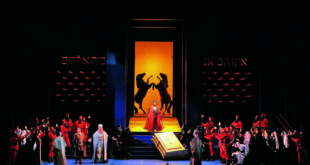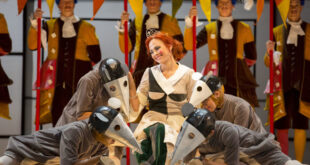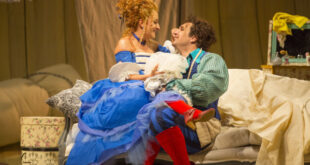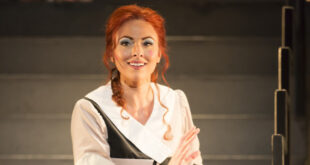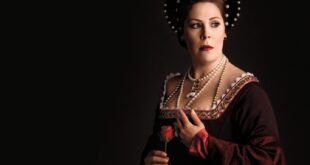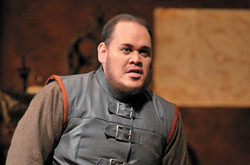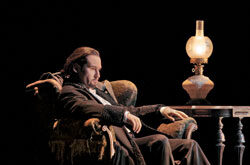Giuseppe Verdi’s “Nabucco” is one of the most significant works of art ever created. Not only is its impact historic in launching Verdi’s successful career as an opera composer and so decidedly affecting the direction of Romantic opera, but it clearly had a historic impact on Italy and European politics. Indeed, it is difficult to imagine what Europe might look like even today if “Nabucco” had not been staged at La Scala in March 1842. Perhaps the greatest miracle of “Nabucco” was that it was the work of a very troubled young composer — certainly a talented man, but …
Read More »Lyric delivers rousing rendition of “Cinderella”
Going back many years, it is hard to remember a Lyric Opera production that fired on all cylinders so marvelously as on the October 23rd performance of “Cinderella.” (No doubt for marketing purposes Lyric calls Rossini’s comic opera “Cinderella” instead of its original, commonly known title, “La cenerentola.”) During the time I have been reporting on the many productions of operas at Lyric, I have never shied away from pointing out (and occasionally discussing “ad nauseum”) various weaknesses in the musical or dramatic presentations, but in this “Cinderella” I was extremely pleased to find only hearty strengths in every …
Read More »Lyric delivers stellar “Figaro”
In nearly 30 years of reviewing opera for this and other columns, never have I been so carried away by the euphoria of experiencing this great art being professionally performed. But the other night, Aass I listened to Mozart’s brilliant overture, played by a group of first-class musicians, I was struck by how lucky we are to have the Chicago Lyric Opera to go to for performances of opera at the highest artistic level. Oh, sure, there’s room for criticism — mainly that Mozart scored the roles of Figaro and the Count for basses, and the Lyric used baritones, …
Read More »“La Cenerentola” at the Lyric
“From rags to riches” has been an extremely common literary theme since literacy began. One of its most popular variations is the “Cinderella” story, which itself has spawned oodles of variations. I myself created one such variation, a one-act musical play for my mostly African-American high school students with a pro football twist back in the ’70s. By far the best-known Cinderella tale is that of the Brothers Grimm, with the mean stepmother, two nasty stepsisters and a Fairy Godmother. In Rossini’s opera of 1817 (libretto by Jacopo Feretti) the stepmother is replaced by Don Magnifico, a stepfather, and …
Read More »“Le nozze di Figaro”
The Mozart-da Ponte “Le nozze di Figaro” (1786) is the oldest opera in the standard repertoire. In other words, it is the first “modern” opera. Before “Figaro,” opera was one thing, afterward it was another. Why is this? As Mozart was coming of age, the European political pot was coming to a rapid boil. The American Revolution was just on the horizon, and the social unrest that would explode into the French Revolution was simmering everywhere. Mozart was not what you would call a political radical or a revolutionary, but he was definitely a man of his times. The biggest …
Read More »Lyric’s “Tosca” showcases stellar new tenor
What a wonderful day of music at Lyric Opera for its production of “Tosca” on March 8 at the Civic Opera House! It was such a gas because I went fully expecting to be satisfied with the afternoon’s performance by the singing of who I think is the best baritone in the world — and that was plenty. I got that all right, but there was something more — something I was totally unprepared for. A tenor. Not just a professional singer with a decent voice, mind you, but a singer with an outstanding, powerful sound — especially in …
Read More »‘Anna Bolena’ review
The opening night performance of Donizetti’s “Anna Bolena” heralded the best all-around production of an Italian opera staged thus far this season by Chicago’s Lyric Opera. I was a bit surprised, because historically, typical Bel Canto works like this one are treated a little like orphans or grumpy uncles — “You’re welcome to sit at the table, but please, take a seat at the other end!” But then again perhaps “Anna Bolena” is not all that typical a Bel Canto opera after all. While most definitely a “number” opera (that is, one vocal or choral stand-alone piece strung together one …
Read More »“Il trovatore” review
At this writing, Thanksgiving is less than two weeks away. I am thankful for many things, and one that I am most grateful for is that I can experience opera performed in Chicago just about as well as it can be done. The Met in New York for over a century was by far the greatest opera company in the USA, if not the world, but with the departure of Joseph Volpe and Franco Zefirelli, the quality of its productions are uneven at best. But you can count on the Lyric Opera of Chicago, however, to consistently stage outstanding productions. …
Read More »“Don Giovanni” review
“Dramma giocoso.” That’s what the man said. We have noted previously that Mozart’s “Don Giovanni” is the “Hamlet” of opera, meaning that there has been more criticism and analysis of this work than any other of its kind. And most of the writing stems from this “dramma giocoso” deal. Literally translated it’s a paradoxical phrase. “Dramma” means serious or tragic and “giocoso” means comical or funny. Italian playwright and librettist Carlo Goldoni coined the term in the mid-18th Century for works of his that had character types from both “opera seria” (tragic, or serious opera) and “opera buffa” (comic opera) …
Read More »‘Tosca’ Preview
Puccini’s “Tosca” (1900) marks the third successive opera (after “Manon Lescaut” – 1893, and “La bohème” – 1896) that the composer worked with a subject that had achieved considerable popularity–in this case, the wildly successful 1887 play, “La Tosca,” by Victorien Sardou, written for Sarah Bernhardt. After the dismal failure of “Edgar” in 1889, which almost ended Puccini’s career, he had been told by a number of people that the main problem with the opera was not the music but the idiotic libretto by Ferdinando Fontana. Fortunately for Puccini, his publisher, Giulio Ricordi, also believed this and continued to support …
Read More » Fra Noi Embrace Your Inner Italian
Fra Noi Embrace Your Inner Italian

